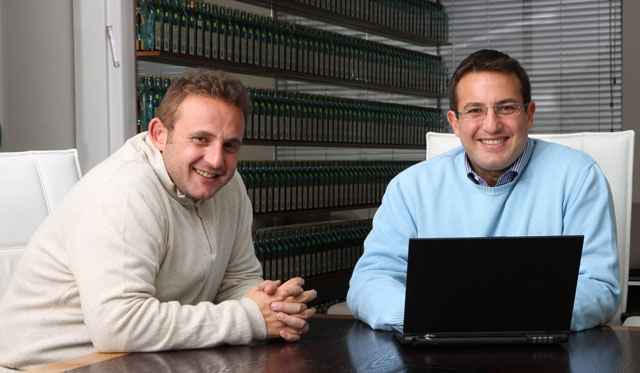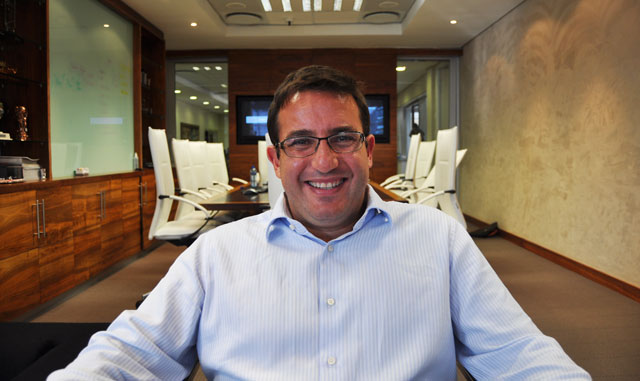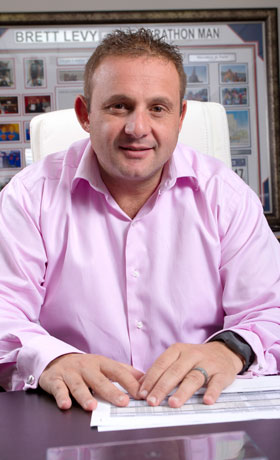
Their father’s death, at the age of just 33, played a big role in shaping the lives of brothers Mark and Brett Levy, the founders and co-CEOs of JSE-listed Blue Label Telecoms. It also gave them some of the drive they needed to thrive in business, says Mark Levy.
“I was eight and Brett had just turned five when we lost our father,” Mark tells me at the start of our 90-minute conversation in the executive boardroom at Blue Label’s offices in Sandton. “That sort of thing forces you to do things differently, it forces you to fight your own battles, and it forces you to rely on each other more.”
Mark, 41, says he and Brett, 37, “climbed into each other like normal siblings” but a special bond formed between the two at a young age. So much so that today they share just about everything, including credit card accounts. They agreed when they were younger that whatever they did in their lives, they’d be 50-50 partners, irrespective of who made or lost money. There’s no contract underpinning this, just a verbal agreement they reached over a drink. “The only thing we don’t share is wives,” Mark quickly adds, grinning.
The pair grew up on the far East Rand, in the small town of Delmas, which Mark says is “somewhere past Benoni”. They both went to Afrikaans public schools — with the exception of Brett’s high schooling, which was at a Jewish school in Johannesburg — and their upbringing is evidenced in both men’s lingo, with is littered with good-natured “howzits”, “chinas” and “boets”.
Mark tells me their success is proof that one doesn’t need to attend the best schools or universities to go on to build great companies and leave powerful legacies. “There also has to be an inbred desire to do things,” he says.

“People always quiz us about what makes an entrepreneur. Why are you different? I think what it is, is people like us aren’t scared to fail, but we’d never accept failure. We are not scared to be knocked down, but champions are people who get up afterwards.”
It’s not that the two men’s relationship is always even-tempered. They often have what Mark calls a “good barney”, but there are never repercussions after they’ve had an argument. “We can scream at each other and have a proper go,” he says. “Even if one of us is not 100% convinced, neither of us has ever later said, ‘I told you so.’ Afterwards, there are no sour grapes. The result is always what’s best for the business and it’s never egotistical.”
The collaboration is clearly working. The brothers have built Blue Label into a JSE-listed multinational with operations in SA, India and Mexico. In the 2012 financial year, the company, which focuses on the virtual distribution of “secure electronic tokens of value” (mainly prepaid airtime for now), brought in R419m in profit on the back of revenues of R18,7bn.
At the time of listing in 2007, it even attracted the attention of Microsoft, which bought a minority stake in the business. The US software giant recently disinvested, but Mark says this was simply because the two companies’ strategies were no longer aligned. The two Microsoft executives who led the transaction, Rafael Fernandez-MacGregor and Manuel Rebiralta — started Blue Label’s Mexican business.
“The Microsoft deal was amazing,” Mark says. “Here was this massive organisation that everyone aspired to finding interest in this lonely company in SA. Microsoft put us on the global map and opened a lot of doors for us.”
It’s been quite a ride over the past two decades, from back in 1991 when the pair started in business together selling televisions, hi-fi sets, car radios and other electronics items from the boot of their car. This expanded quickly into the insurance replacements business and over time the pair built up a powerful distribution network that would later go on to form the basis for Blue Label’s formation and expansion.
Mark says one of the brothers’ successes in business has been their willingness to “lead from the front”, to get involved on the shop floor with ordinary employees, and that’s something they continue to do at Blue Label.
“In the early days we used to pack boxes and do everything ourselves,” he says. “There was no hierarchical crap.”
He tells me a key philosophy at Blue Label is to give people the ability to make their own decisions and even to fail. “To get fired from Blue Label is a complex and difficult thing. We get more upset about people not making decisions than making them. Wrong decisions aren’t frowned upon.”
It was when the pair signed a contract with Telkom around 2001 to sell prepaid fixed-line telephony that the Blue Label as it’s known today was established. Telkom was followed by Vodacom, MTN and Cell C at the time that the prepaid cellphone market in SA was just starting its steep upward climb.
Mark and Brett realised there was a big opportunity to replace the physical distribution of prepaid cards and tokens with an electronic system. “The networks realised that moving physical products was expensive, that they had to produce hundreds of millions of cards that had to sit in a warehouse,” Mark recalls. “There’d be pilferage, the hijacking of vehicles. Merchants also had limited cash and, as the range of networks and offerings got bigger, it became more complex to manage cash flow. The only logical solution was to create a technical and virtual solution — that’s where this whole thing began.”
Today, Blue Label is by far the biggest distributor of prepaid airtime in SA and is using its infrastructure to expand into complementary areas, including prepaid electricity. In the 2012 financial year, the company’s commission from the sale of prepaid electricity rose by 39% to R85m.

Mark says it was “tough going” in the early days convincing the network operators and merchants that they should work through a middleman like Blue Label, believing they could do it themselves. “Over time, after many years of showing the convenience and efficiency, suppliers finally realised we offered them a value proposition and merchants realised we were a great aggregator to them — a great way for them to sell multiple new products and services without incurring additional costs.”
Former Vodacom CEO Alan Knott-Craig — now head of Cell C — also played a key role in Blue Label’s early successes. “He went out of his way to give us a decent contract,” Mark recalls. “Vodacom was the first operator to embrace distribution properly and Alan never begrudged us for whatever money we did or didn’t make. He was a good sounding board and was not scared to give us his opinion.”
He tells me his and Brett’s rapport with Knott-Craig exemplifies the “trust relationships” so important for success in business.
“The world has created sceptics, so the more you can build these trust relationships, the more likely you are to succeed with these people wherever they go. You don’t have to prove yourself again.”
As we are wrapping up the interview, I ask Mark about the large, floor-to-ceiling wall of empty Blue Label whisky bottles adorning one side of the boardroom. “When we started the business, we had a bottle of Blue Label,” he says. That’s where the two men came up with the name of the company. “Every time we did a deal, we wrote about it on the back of a bottle and everyone who was privy to the deal signed the bottle. It’s become a tradition.”
He says the Johnnie Walker brand has never contested its intellectual property, and was, in fact, quite amenable to the Levys’ use of the name for their company. The only challenge the company faced came from Bakers, makers of Blue Label Marie Biscuits. “We agreed not to start making biscuits and they agreed not to start selling airtime.” — (c) 2012 NewsCentral Media

